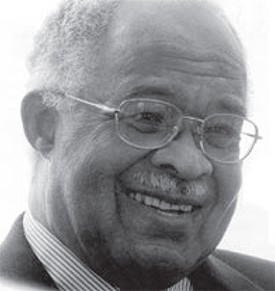
William R. Miner earned an MSW with a major in community organization and administration from the University of Michigan School of Social Work while the school was in Detroit and known as the Institute of Social Work. Miner’s degree prepared him for a career that spanned oceans, continents, and nearly five decades.
Much of the work Miner did throughout that career involved starting something new. “Th e most essential part of my work was at the village level,” he said. “I helped villagers realize and use their own strengths and resources in making a better community. What fun to see the pride they felt when they built a better road into the village, constructed a one-room school, or protected a drinking water source.”
During Miner’s years at Michigan, he was graduate assistant to several prominent early staff members: the casework faculty, Professors Eleanor Cranefi eld and Clarice Freud; Dr. Arthur Dunham, professor of community organization and administration; and the Institute director, Robert Kelso. A fi eldwork assignment placed Miner with the Council of Social Agencies of Metropolitan Detroit. Upon graduating, he hoped to be the fi rst AfricanAmerican in a professional staff position there. Professor Dunham advocated for him, but it was not to be.
The most exciting of these assignments was four years in Kenya. I participated in the birth of Kenya as a nation…
Miner’s career in developing urban communities began when he became the fi rst neighborhood health educator for the Marion County Tuberculosis Association in Indianapolis, IN. During his three years there, he worked with community groups to stage health service programs, such as mass x-ray screenings and cleanup drives.
Miner’s urban focus continued during his three years as director/coordinator of the Cass Community Pilot Project in Detroit. He coordinated the work of more than 40 public and private health, welfare, recreational, religious, and educational organizations. “I had no budgetary or administrative authority,” he said, “I had to encourage and convince people.”
Miner’s efforts signifi cantly increased the level of service provided to 10,000 residents of a public housing project. Th e Cass Community work garnered local and national attention, and later proved to be a forerunner of the national War on Poverty
On the global front, Miner fi rst worked two years in an Arab village in Israel for the American Friends Service Committee to help modernize agricultural practices. In his next international assignment, he served as the United Nations Community Development Expert to the Government of Liberia. In 1960, he began working for the United States Agency for International Development (USAID). For the next 38 years, he served in various capacities, in both Washington, D.C. and overseas. His overseas postings as community development advisor to national governments included Kenya, Korea, Tanzania, and Togo.
“The most exciting of these assignments was four years in Kenya,” he said. “I participated in the birth of Kenya as a nation, helping create a national community development program and training native Kenyans to staff and administer it.”
Other USAID assignments were as U.S. representative to meetings in Geneva, London, Paris, Rome, Manila, Mexico City, Tokyo, Rio de Janeiro, Vancouver, and the United Nations in New York City. Miner also served in the geographic bureaus for Africa, Asia, and the Near East. He was the original and only director of the Offi ce of Urban Development for 10 years. When he offi cially retired in 1998, he was a social science analyst in the Bureau for Population and Health.
Miner never stopped learning and sharing his expertise with others. He received an honorary LL.D degree from the College of Wooster in Ohio in 1969 and earned a doctorate from Brandeis University in 1976. His dissertation examined the role and relevance of USAID’s technical assistance program in U.S. foreign policy. Th roughout his career, he lectured at various schools and organizations and mentored graduate students in social work and other fields.
Miner remains active today at the age of 87. He is currently reading the 3,000 letters he wrote his mother over 46 years. He did not know she saved them. Miner is sharing many of the letters with friends who are still living, and/or with their families.
“One of these days,” he said. “I really am going to retire!”
Jo Ellen Roe, freelance writer